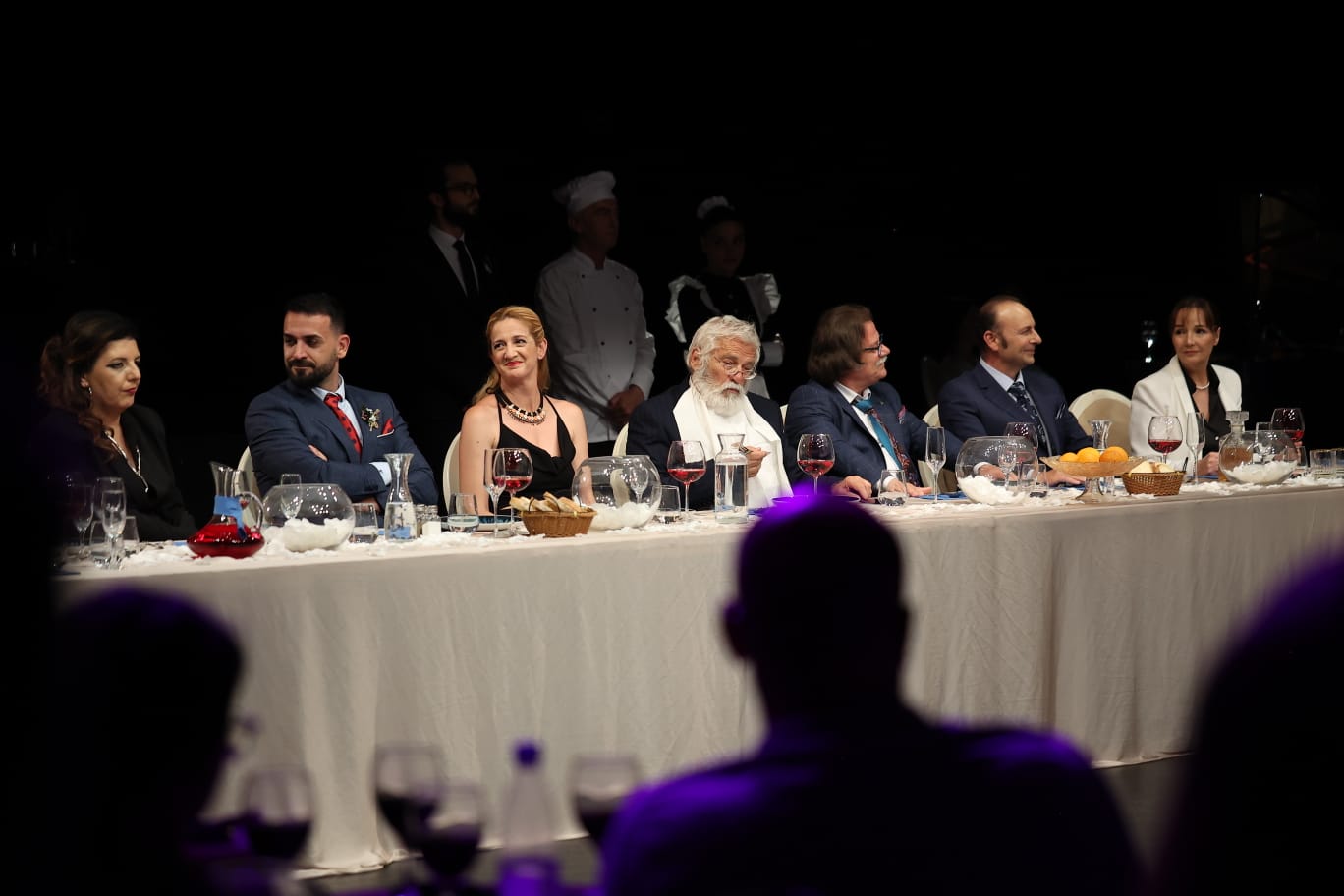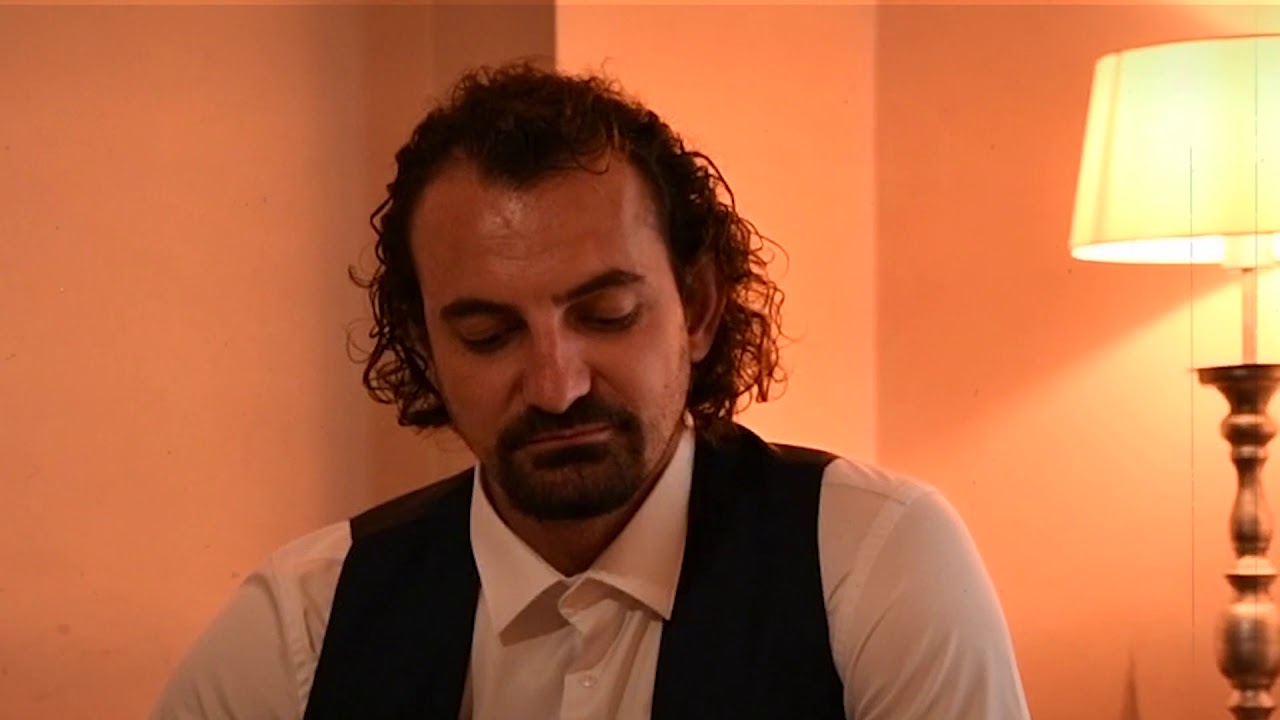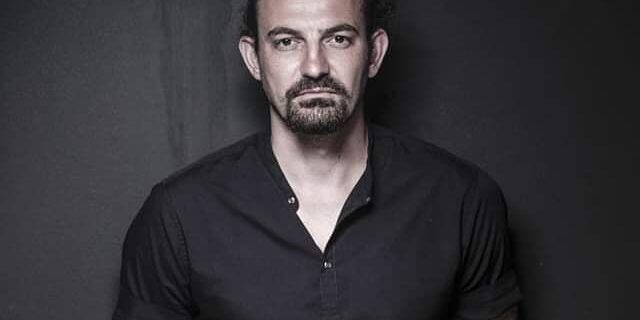Besmir Bitraku, an actor with Albania’s National Theater, recently made his debut as a director with the darkly comic play Festen. He talks to Flamur Dardeshi about his motivations for staging this play and the challenges of making theater in Albania.
Festen, the final production in the current artistic season of the National Theater of Albania, is a stage adaptation of Thomas Vinterberg’s 1998 Danish film of the same name by the English playwright David Eldridge. Besmir Bitraku’s production puts the audience on stage together with the actors in a tense drama about revelations of sexual abuse by a family patriarch during his birthday celebrations.
Flamur Dardeshi: Your production of Festen was a success. Why did you choose this particular play?
Besmir Bitraku: Personally, I don’t consider the size of the audience to be a sign of a successful show. Some shows have an audience that is so large, they even add extra chairs. They are a success in tickets but not necessarily an artistic success. If we [look at] it this way, Festen was a success, since I only had 100 seats and they were all filled two weeks in advance. But I believe that the play was also an artistic success because it got you thinking. It was successful because people kept talking about it after the performance ended. That play has pushed people to reflect a little more deeply.
Rather than simply describing a history of abuse by the father of the children, the play aims to answer the questions of how this event [came to pass] and how things came to this point. We only respond when such events take place in front of our eyes and rarely stop to reflect upon them as a culture. [Even though] these phenomena frequently occur [in Albania] as well.
Flamur Dardeshi: Even though television deals with these topics, it was weird to see something similar in a theater. Can, and should, theater help society deal with these issues?
Besmir Bitraku: There is undoubtedly a lack of focus on these topics [in theatre]. These days comedy has largely taken over, primarily because it draws in more spectators since the artists’ financial situations are poor and the theater must be filled. I’m specifically referring to private shows here. In an effort to fill the theater, the artists often strive to perform plays that attract [larger audiences], regardless of quality.
Public shows should undoubtedly address social issues much more; they have made some attempts [in this respect], but they have tended to focus more on politics and, in general, the psychological condition of the individual rather than more specific societal issues. This piece had been circulating in the hands of many directors for some time, before [director] Altin Basha gave it to me.
Flamur Dardeshi: Did he give it to you to read it or to stage it?
Besmir Bitraku: He gave it to me and told me to read it. He was planning to put it on stage himself when he gave it to me. My desire to stage the play the way I believe a play should be staged caught me up in its momentum, and I succeeded in doing so. Many were sceptical about the subject matter because they believed people wouldn’t get it. However, people did understand it – and people reacted to it.
Flamur Dardeshi: What was it like to make the transition from an actor to a director? Do you have more opportunity to express yourself as a director than as an actor?
Besmir Bitraku: To be completely honest, since I also handled the production myself and it is a really demanding work, it was quite challenging for me. However, because it was more enjoyable for me than acting, I completed it with greater love. I endured some difficulty while organizing everything, but once I did, a natural flow began. Having everyone there was a very great experience. Now, as a result of this, I believe I am a better actor. It certainly arrived when it needed to. I think my artistic development has matured after this experience. It arrived precisely [at the right] time.

Festen
Flamur Dardeshi: The national theater and the experimental theater are housed in a modestly sized structure with only two halls. It frequently happens that two totally different plays are performed on the same night. Is this limited space insufficient?
Besmir Bitraku: I don’t truly see this as a problem. People have both options, and they can choose. It is better to have as much variety as possible.
Nothing is appreciated here, yet nothing is decried either. If you put on a quality theatrical production here, I can assure you that no one will come and request that you stage another play. You have to start again every time you do something. I [have to] find the strength to start again from scratch. Nobody has any control over this.
I have come to the conclusion that everyone must continue to fight his small battle from his small trench. I do theater because I can’t picture my life any other way. I have my own business and I do other things for a living and while I would like to have more time to devote exclusively to the theater, there isn’t another way around it.
In the future, I would really like to stage a play about an honest politician in Albania. If only I had a writer to do this for me. Some things require external change in order to be transformed. Making people aware that there are other hues in the universe besides black and white would be interesting.
Flamur Dardeshi: What role should theater play in our society? Art Turbina is somewhat outside of the heart of the city, as well as in the general discourse.
Besmir Bitraku: The theater’s aims are to entertain, educate, and inform. Can you combine the three into one by alternating them? Theater, in my opinion, is food for the soul that helps you understand life as more than just a struggle for survival. When a man thinks, he lives. It’s a method to show people the things that typically pass them by without being given any thought.
Flamur Dardeshi: Is theater doing this?
Besmir Bitraku: Theater is doing as much as society is doing.
Flamur Dardeshi: You are an actor’s son. How did you come to choose a career in theater?
Besmir Bitraku: It came naturally. I could tell that my dad was well-liked in the community. People smiled at him as they passed him on the street. Evidently, as a little child, I had this idea in my head, “It’s good like this”, I guess I told myself, people like you. I then made the decision to study in the Academy of Arts. The theater is amazing. If you enter, it absorbs you, and you are unable to escape. Even those who have never attended a theater performance will continue to do so as a ritual if the performance that they attend for the first time is good. Quite another thing happens if your first performance is a bad performance.
Flamur Dardeshi: What is it like being a young actor and director in Albanian theater?
Besmir Bitraku: I’m proud of who I am and the work that I do. I’d like to be appreciated more for the role I play and the work I do. For instance, a performance of an actor is compared to an accident. There is research about it, and from a psychological perspective, it is thought to be true. However, I love my work, and that is sometimes enough.

Besmir Bitraku
Flamur Dardeshi: Regarding partnerships with other theaters or directors in nearby countries, Albanian theater is somewhat isolated. Does doing theater make you feel a little alone as a result?
Besmir Bitraku: The issue with everything is money. The National Theater has a yearly budget of 120 million lek. That is what a typical TV show host makes. Without a doubt, collaboration between the National Theatrical troupe and the Pristina theater troupe would be very positive. Let four actors do a performance here, and four of us travel there. For two states, this is not a big deal. But it seems it is for our country. Money is required for everything. We have now petitioned for pay raises, but then the minister told us not to be selfish because we are in a time of economic crisis. Yes, this approach also depicts how the river flows from one to the next, from the larger one to the somewhat smaller one, like matryoshka dolls. This is why I don’t see any other solution but fighting your small battle.
Flamur Dardeshi: There is an ongoing debate regarding the approach we should have towards art created before the 1990s under the communist regime. The communist era play The Prefect, was staged as an artistic reading at the National Theater some months ago. As part of the new generation of actors at the National Theater in Albania, what do you feel about this?
Besmir Bitraku: I was part this artistic reading as well. People reacted. They did not recognize its significance. The director wanted to treat the lead character as intelligent rather than making fun of him as in the original comedy.
Flamur Dardeshi: As a piece of writing, it is problematic, dogmatic, and full of propaganda.
Besmir Bitraku: He aimed to rehabilitate that character’s reputation.
Flamur Dardeshi: Did he succeed?
Besmir Bitraku: It didn’t work out – maybe because it was just a reading. The signal was there. If it had been staged, it would not have been like the reading.
Flamur Dardeshi: Do you think reading that play was irresponsible?
Besmir Bitraku: No, I believe people were rushed in their judgment; yes, it very well may have gone in that direction. I am an insider and the tendency was to reject the propaganda. Given that it was only a reading, it is not to be judged. Perhaps the result was not how it should have been, but the trend was positive.
Flamur Dardeshi: What happened to the National Theater building? Two years of protests, followed by its destruction…
Besmir Bitraku: I was one among those people that protested outside of the Theater in the first year. Then George Orwell’s Animal Farm was planned to be staged and I gave up. Could a new theater be built while the old one is preserved? It would be fantastic. That wasn’t an option for us. I believe Albania needs a good theater building to improve the calibre and standard of performances. We wouldn’t have a new one if the old one hadn’t been demolished.
Flamur Dardeshi: It was demolished, but we still don’t have a new one.
Besmir Bitraku: We don’t have it. This is a double tragedy. I don’t think they have a way out, though. I think they’ll build it. They aren’t crazy enough, in my opinion, to build a skyscraper there. At least the territory was preserved in order to once again serve as a theater, therefore the battle of the artists had some value. Some people appeared to have changed sides. The conflict was tough. To obtain those meters of territory, some had to publicly announce their opposition. The sooner the new one it is built, the better for everyone. I definitely felt sorry for the old one. If there had been more goodwill, in my opinion, the old one would have been kept and a new one would have been built. However, given the circumstances we face and these nuances, you realize there is no alternative and accept this reality by saying “okay.”
Further reading: The Demolition of the National Theater of Albania
Further reading: The Return of The Prefect – reviving the past
Flamur Dardeshi is a freelance writer based in Tirana. He has contributed in the areas of translation, analysis, and poetry. His main fields of interest are literature, cinematography, and theatre.








